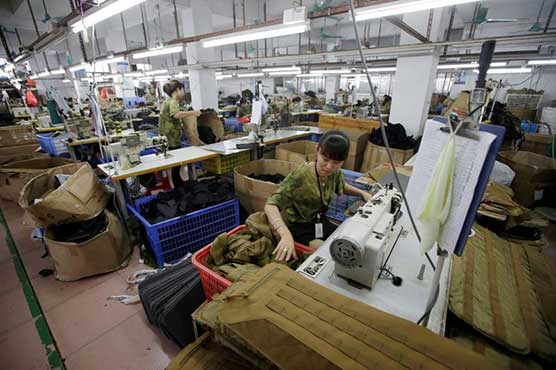Globalisation revised but not reversed by COVID

From Washington to Wellington, politicians this year have preached self-sufficiency
CHICAGO/BRUSSELS (Reuters) - New York-based Delta Children, which makes cribs in China for retailers such as Walmart, briefly studied moving production to the United States as supply shortages caused by the COVID-19 pandemic added to its hefty bill from U.S. import tariffs.
Commerce Secretary Wilbur Ross predicted in January the pandemic would "help accelerate" this type of re-shoring of jobs to the United States, while some policymakers even spoke of a wider retreat of globalisation as companies retrenched to deal with severed supply chains.
But Delta chief executive Joe Shamie finally ruled out the move due to higher labour costs and a lack of suppliers. The company still plans to diversify its supply chain - but by moving some production to South East Asia.
"The Made-in-USA tag will work if the products are of the same quality and competitively priced, which is not case at the moment," Shamie told Reuters. "I would diversify, not totally leave China."
While global trade volumes have inevitably fallen as the world plunged into recession and travel restrictions and social distancing curtailed the movement of people, the economic ties built up by successive waves of globalisation are proving more resilient than some thought.
Trade in goods is set to decline by 9% this year, the World Trade Organization forecast on Tuesday, less severe than its April prediction of a 13-32% plunge. China s industrial sector is steadily recovering to pre-pandemic levels, with exports up 9.5% year-on-year in August, their sharpest rise in 18 months. Optimism among German exporters hit a two-year high in September.
PROTECTIONIST RHETORIC
From Washington to Wellington, politicians this year have preached self-sufficiency, urging firms to bring production home, particularly of "essential" products.
The pandemic has led to a record 235 export restrictions as countries hoarded protective equipment and medical supplies, according to monitoring service Global Trade Alert. The impact of trillions of dollars of subsidies is still unclear.
But despite the drum beat of protectionist rhetoric, there have been far fewer new import tariffs than in the past two peak years, and Pascal Lamy, who led the WTO from 2005 to 2013, believes re-shoring will be marginal.
"The reason there will be more talk than walk is simple – it s costly," said Lamy. "Globalisation is efficient and painful. De-globalisation is inefficient and painful."
The only high-profile country to put up funds is Japan, with 220 billion yen ($2.08 billion) earmarked for firms re-shoring production. In a first round, it paid 57.4 billion yen for 57 projects - less than $10 million per firm.
"Senior policymakers have made a whole range of strong statements, but it hasn t reached a stage yet where there s a lot of money on the table for repatriating factories," said Simon Evenett, Global Trade Alert founder and professor at Switzerland s University of St Gallen.
Even before COVID, a key aim of U.S. President Donald Trump s tariff war on Chinese imports from 2018 was to repatriate production. Companies, on the other hand, were drawn from China to lower costs in Southeast Asia and adopted a "China Plus One" strategy to boost supply diversity.
"Whether or not (the pandemic) leads to much more re-shoring into the U.S. market itself remains to be seen," Michael Froman, U.S. Trade Representative in the Obama administration, told a webinar.
JUST-IN-CASE
Consultants at McKinsey & Co say supply chain issues have grabbed the attention of chief executives and board rooms with COVID delivering the biggest and broadest value chain shock in memory, albeit only the latest in a series of disruptions.
Instead of focusing solely on procurement costs, companies are starting to consider stability and resilience.
"Supply chains were built to be just-in-time. Going forward they might be built for just-in-case ," said Susan Lund, a McKinsey partner leading research on globalisation and trade.
McKinsey estimates 15-25% of world goods trade could shift location over next five years due to business arguments and non-economic factors such as regulation, compared to 8% during the past five.
Patrick Van den Bossche, a partner at consulting firm Kearney, which produces an annual re-shoring report, said it would at best be some time before the U.S. benefited from the supply chain diversification being forced by COVID-19 and the trade war.
"The big wave, if ever there is to be one, will be at a minimum five to 10 years away because the basic infrastructure to accommodate a big re-shoring wave is just not there," he said, adding this included sufficient skilled workers and suppliers.
Companies which have taken the plunge to shift some manufacturing to the United States in the past decade include General Electric in Kentucky and Starbucks in Ohio, according to the U.S. Reshoring Institute.
However, the WTO said on Tuesday that the share of intermediate goods in trade had been stable over the first half of 2020, at 52%, suggesting there was no major shift towards re-shoring this year. The U.S. August trade deficit also hit a 14-year high.
Last year, Mexico and low-cost Asian countries were the main beneficiaries of China s falling share of imports into the United States. Despite the pandemic, Vietnam s overall exports rose 4.2% in the first nine months of 2020, with the United States and China its top two markets.
Lamy says dealing with COVID-19 and preparing for a future pandemic will inevitably lead to more focus on protecting consumers, with greater insistence on precaution, safety, more checks and a different view of risk.
"The upwards re-pricing of risk will redistribute this multi-localisation. It s not going to be de-globalisation, it s going to be another version of globalisation. It s a new arrangement," he said.

